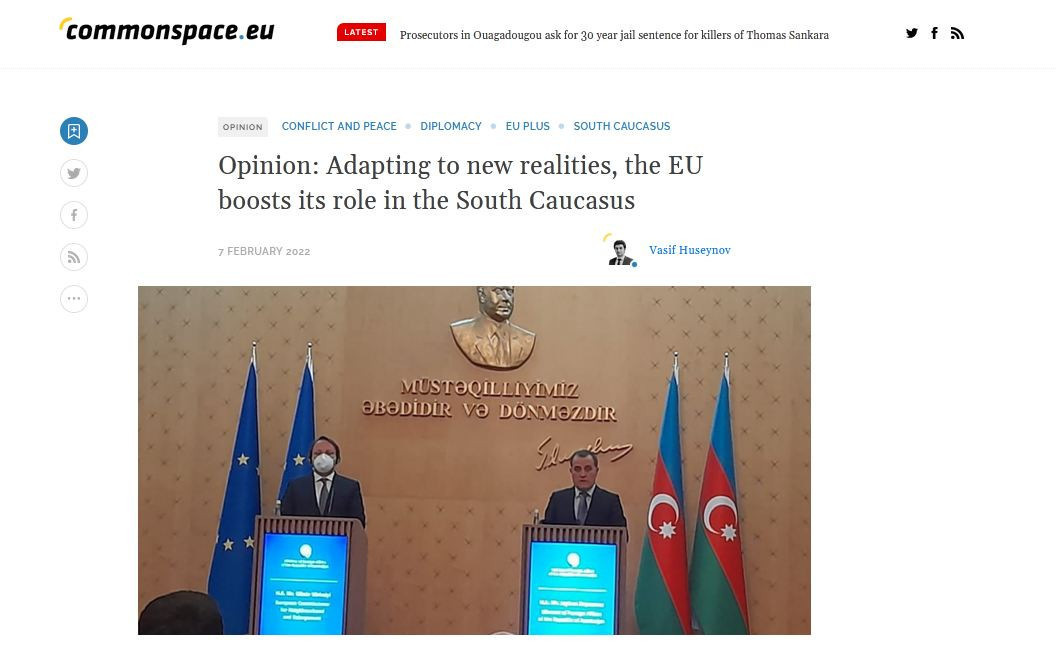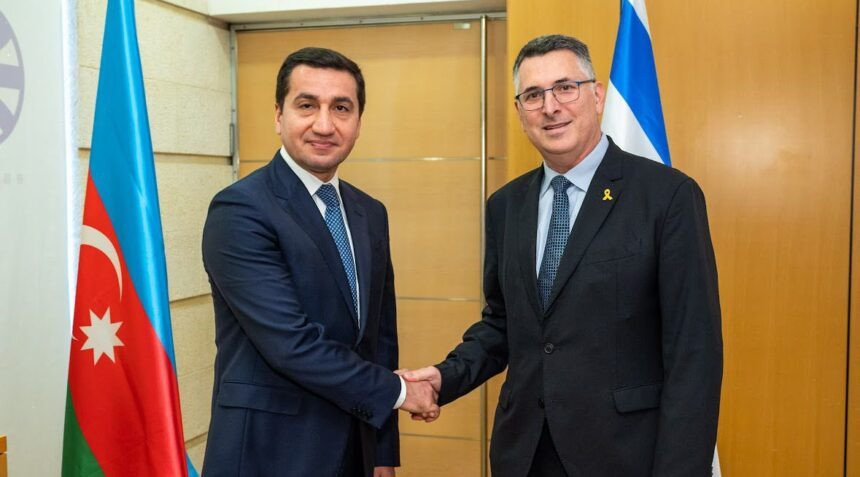The rise of right-wing, nationalist populism in the global politics illustrated by the North American domestic turmoil, Brexit and European elections appears to be gradually diffusing into the capitals of the South Caucasus. Although Azerbaijan has so far succeeded to remain unaffected, two other regional states – Armenia and Georgia – show a strong predisposition to it. The recent developments between Georgia and Azerbaijan and the abrupt changes in the rhetoric of Armenian Prime Minister Nikol Pashinyan over the last year should be deemed alarming for the regional affairs.
The Right-Wing Populist Threat Slowly Takes Over the South Caucasus
The Western states have been suffering from the plague of populism armed mostly with right-wing, xenophobic and nationalist components for a few years. The success of some politicians in the West who manipulate the sentiments of their citizens that are most negatively affected by the conventional policies of their governments emboldens the politicians in other regions to adopt similar techniques in their political platforms. The trend has gained a strong momentum and appears to have reached the politics in the South Caucasus.
Azerbaijan seems to be the only regional country that is remarkably resistant to right-wing populist wave which has been possible due to the political atmosphere of the current leadership. Few political groups who attempt to employ right-wing populism are effectively sidelined by the government partly because those groups lack effective communication with the society and necessary popularity to get politically more influential. The situation in this regard is strikingly different and alarmingly dangerous in the other two regional states – Georgia and Armenia.
Populism and right-wing movements have long been present in the Georgian politics but slowly gain a particular strength by combining the two approaches in a single agenda. This was first felt in 2016 parliamentary elections which brought the Alliance of Patriots of Georgia, a commonly known as a right-wing populist party, to parliament by a small margin, while several liberal parties missed the 5% threshold. The parallel growth and increasing visibility of far-right groups (e.g. the Georgian March, Georgian National Unity, etc.) in the country proved the transition of right-wing populism from the ideology of marginal groups into a matter of Georgia’s high politics.
The anti-migration protests held by the Georgian March in July 2017 and attended by more than 2,000 supporters of the movement raised slogans against illegal immigrants and called for the tightening of national immigration laws. Similar protests happen more often ever since. However, the consequences of the right-wing populist rise in Georgia are not confined only to the domestic politics but also affect the country’s external relations as illustrated by recent provocations against Georgia’s long-established strategic partner – its eastern neighbor, Azerbaijan.
As opposed to Georgia, in Armenia populism is not only a political instrument of the opposition and civil society but also has diffused into the agenda of the ruling elite. Nikol Pashinyan, Armenian Prime Minister, who was brought to power by a nation-wide popular upheaval last year, was first seen as a reformist leader who would settle numerous political and economic problems in Armenia and also play a constructive role in the resolution of Armenia – Azerbaijan conflict over Nagorno – Karabakh and surrounding regions.
Not only in Armenia but also in Azerbaijan there was a widespread optimism concerning the new Armenian leader, who, unlike his predecessors, was not a member of the so-called Karabakh clan, a group that had ruled Armenia for a long time since 1999 and allegedly did not shy away from shooting its own people, for example in March 2008, to keep itself in power. However, the policies Pashinyan pursued in the months after coming to power and the abrupt changes in his rhetoric exemplified especially by his recent statements in Nagorno-Karabakh betrayed that belief in him and sounds an alarm for both the domestic politics of Armenia and its conflict with Azerbaijan.
In his address at the opening ceremony of the Pan-Armenian games that were held illegally in Khankandi, part of the Armenia-occupied internationally recognized territories of Azerbaijan, in early August, Pashinyan voiced strikingly populist goals. Calling for the unification between Armenia and Karabakh, he broke the tradition of former Armenian governments that used to deny Yerevan’s control over the “Nagorno-Karabakh Republic” and made a direct provocation to the Azerbaijani side.
Pashinyan also declared seemingly unrealistic goals regarding domestic politics of the state. For instance, he promised to boost the less than 3 million population of Armenia to 5 million by 2050, while a latest demographic report by the United Nations Organization expected Armenia’s population to shrink to by 913,000 to 2,039,000 by 2100. FIFA World Cup, GDP increase by 15 times, development of at least five technology companies whose value exceeds $10 billion, reaching the top twenty countries by the army’s combat readiness index and top ten countries in the intelligence service were among the unrealistic objectives he declared to an audience who have long been suffering from economic decline.
Against this backdrop, one of the first incidents triggered by this trend occurred on the border between Azerbaijan and Georgia over David Gareji/Keshikchidag monastery complex that is located in Azerbaijani side but claimed by Georgians to be part of their historical religious culture. Although the two sides have been long trying to complete the delimitation process and resolve the disagreement over the status of the monastery complex, it has not been possible due to various reasons. Nevertheless, thanks to the fully-fledged partnership between the two countries the issue had never evolved to be a matter of confrontation between the governments.
The growth of radically nationalist and populist groups in Georgia has, however, started to jeopardize the situation in the region. The demonstrations led by the Union of Patriots of Georgia and attended by some thousands of people under the slogan “David Gareji is Georgia” or the attack against the Azerbaijani guard service around the monastery complex by those radicals over the last two months threaten, in general, the relationships between the two countries that strategically need each other to stave off the intervention of external forces. Although it could be possible to keep the situation under control thanks to the reserved reaction of the Azerbaijani soldiers and Azerbaijani government, but a possible future provocation by those radical groups would unravel in a different way to the detriments of both countries.
A similar confrontation, but with potentially more dangerous implications, is underway between Armenia and Georgia, triggered by the nationalist, populist volte-face in the rhetoric of Armenian Prime Minister Nikol Pashinyan. It has been recently reported that his push to more nationalist statements in foreign policy narratives encourages nationalistic groups of Armenia to more effectively support ethnic Armenians in Georgia’s Javakhetia region. This support offered by Yerevan has the potential to revitalize the old inspiration of those Armenians in Georgia to fight for unity with Armenia. This poses another secessionist challenge to Georgia that has already lost control over the two breakaway regions – Abkhazia and South Ossetia – in the wake of 2008 war.
The South Caucasus looks increasingly more prone to confrontations and possibly military clashes
The growth of right-wing populism as a political approach in the South Caucasus is particularly affected by the economic challenges, the failure of the governments to materialize impactful reforms and thus the withdrawal of public support to incumbent leaders. But a recent change in the political systems of the two states that are hit by this trend bears the risk to more complicate the situation: the shift to the proportional-representation based parliamentarism in Armenia and Georgia.
Georgia’s complete transition to proportional representation with no threshold will give a chance to the populist political groups to enter parliament much more easily. This pushes those marginal groups to employ more radical agendas to gain popularity and recruit electoral support. A similar trend is occurring in Armenia that shifted to parliamentarism last year. In a similar vein to that in Georgia, parliamentarism will allow Armenian nationalist and populist elements to gain stronger political role in Armenia’s politics which has a high potential to cause more problems in the state’s relations with Georgia and Azerbaijan.
Against this background, the rise of right-wing populism in the world appears to gradually evolve to be a matter of daily politics also in the South Caucasus and risk to make the region increasingly more prone to confrontations and possibly military clashes.








